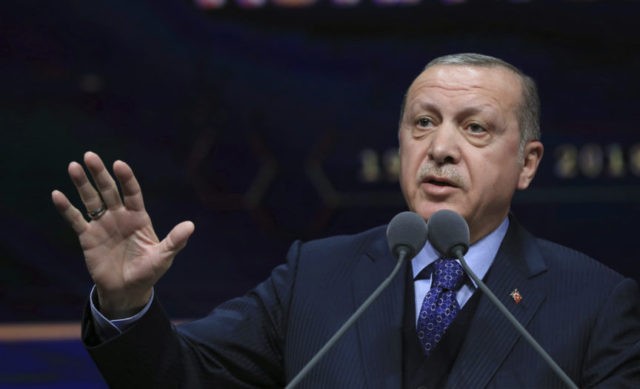Turkey’s President Recep Tayyip Erdogan warned Iraq that his military would “do what is necessary” and attack Sinjar, site of the Islamic State’s Yazidi genocide, if Baghdad did not occupy the area and forcibly expel Kurdish forces there.
The Islamic State (ISIS) killed at least 10,000 Yazidis in a genocidal campaign concentrated in Sinjar that also included mass abductions of women to be used as sex slaves. Of those killed on Mount Sinjar, an estimated 93 percent were children.
ISIS was expelled from Sinjar through a joint effort consisting of American airstrikes and ground attacks by the Kurdistan Workers’ Party (PKK), a U.S.-designated terrorist organization. The PKK remained in Sinjar after the fall of ISIS, first taking up the fight after Iraqi Kurdish Peshmerga opted not to continue in the region.
Whether Yazidis are ethnic Kurds is a matter of intense debate, as they adhere to their own religion, while most Kurds are Sunni Muslims. The Iraqi Kurdistan Regional Government (KRG) has long opposed a PKK presence in Sinjar and called on the group to leave Iraq entirely. The PKK has its origins in Turkey.
The Turkish government launched an invasion of Syrian Kurdistan in January, arguing that the PKK is indistinguishable from the U.S.-allied People’s Protection Units (YPG/YPJ) fighting ISIS in Syria. The United States relied on the YPG’s support to expel the Islamic State from many of its Syrian strongholds, including its “capital,” Raqqa. After taking over Afrin, northern Syria, Ankara announced it would continue into Manbij, where U.S. troops are stationed, unless the Americans helped expel the YPG from the area.
On Monday, Erdogan once again threatened expansion into Sinjar, announcing that high-level meetings to discuss Sinjar were scheduled between Ankara and Baghdad. An envoy, he announced, would meet with Hakan Fidan, the head of Turkey’s National Intelligence Organization (MIT).
“Our hope is that Iraq will complete the operation there thoroughly,” Erdogan said, according to the Turkish newspaper Hurriyet. “If not, let’s hold our bilateral meetings and we will do what is necessary in Sinjar. We don’t have much tolerance for Sinjar.”
The Iraqi government confirmed later in the day that the military had deployed into Sinjar with the goal of expelling the PKK.
Erdogan warned Iraqi officials last week that he would intervene in Sinjar if the PKK remained there.
“We have told the central [Iraqi] government that the PKK is establishing a new headquarters in Sinjar. If you can deal with it, you handle it. But if you cannot we will suddenly enter Sinjar one night and clear this region of terrorists,” Erdogan said.
“If we are friends, you will make it easy for us,” he added. “We told all this to previous Iraqi central governments as well. If things are furthered prolonged then another ‘Operation Olive Branch’ will be carried out there.”
“Operation Olive Branch” is Turkey’s name for its invasion of Syria and greater effort to erase the Kurds from Iraq and Syria.
PKK officials in Sinjar had already begun indicating that they would withdraw from the region last week, following threats from Erdogan. According to Turkish state news agency Anadolu, Sinjar District Governor Mahma Khalil confirmed that he had convinced the group to leave, adding that “the withdrawal follows repeated demands [that the PKK leave the district] by the local population.”
“Sinjar’s local administration on Thursday officially asked the PKK to leave the area,” Khalil added. He noted that the troops would be replaced by some members of the Popular Mobilization Forces (PMF/PMU), a coalition of mostly Shiite Iran-backed militias that have attacked Americans in the past. The PMF became a legal military arm of the Iraqi government before the operation to liberate Mosul from the Islamic State.
On Friday, PKK officials issued a public statement announcing their withdrawal from Sinjar, suggesting that Iraqi troop movements into the region were more to protect it from a second Islamic State attack than to come into conflict with the Kurdish fighters. Yet on Monday, PKK commander Kawa Sheikh Mous told the Russian propaganda outlet Sputnik that the PKK were not withdrawing.
“At the moment, there is no movement of Turkish [forces] in the town of Sinjar, Nineveh Governorate. If this happens, we will respond with force to protect the Yazidis [a Kurdish religious minority],” he reportedly told the outlet.
The PKK declared “democratic autonomy” in Sinjar in August 2017, announcing that, after protecting the region from ISIS since about 2015, they had returned control to the Yazidis who had returned. Much of Sinjar remains in ruins, with little infrastructure, electricity, or food resources. PKK fighters have insisted they would only leave if the Yazidis retained full control of the area.

COMMENTS
Please let us know if you're having issues with commenting.